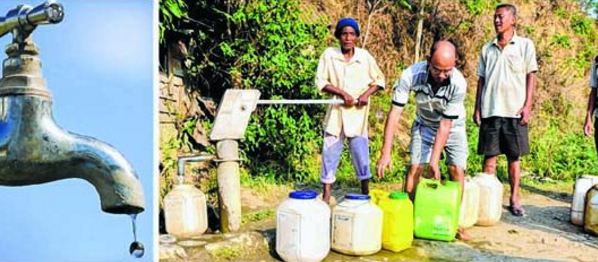
Given this sorry figure which has been compounded by financial constraints and short working season, the State Government’s promise looks highly dubious.
Under the Central Government’s flagship programme National Rural Drinking Water Programme (NRDWP), another target was set to make potable water accessible to all habitations of Manipur by 2030, informed an official source.
NRDWP was launched on March 23 this year on the World Water Day.
However, the BJP-led coalition Government is set to embark on an ambitious project to prepone the target year set under NRDWP by eight years to 2022.
Despite this vision and target, only 166 habitations out of the total 2870 have access to reliable potable water facilities as of now.
While 2537 habitations have partial access to potable water, 167 habitations have no access to such facility.
Usually, commissioned water supply plants are entrusted to Village Water and Sanitation Committees for operation and maintenance.
As per instruction from the Ministry of Drinking Water and Sanitation, Central funds sanctioned during the current financial year would be used in completing incomplete projects and maintenance of completed projects.
According to the instruction, no new water supply projects would be taken up this financial year, informed the source.
Of the 166 habitations where all the people have access to potable water by April 1 this year, 64 habitations are located in Churachandpur district, 24 in Senapati, 21 in Ukhrul, 14 in Tamenglong, 14 in Imphal East, 10 in Bishnupur, eight in Imphal West, seven in Thoubal and three in Chandel .
Under NRDWP, each individual would be provided 55 litres of potable water every day.
The total population of Imphal city and greater Imphal areas is 6.65 lakh and the projected population figure for 2031 is 8.70 lakh.
At present the total volume of potable water required at Imphal city is 120.48 MLD (million litres per day) and the same figure would rise to 152.142 MLD by 2031.
The total installed capacity of water supply plants supplying potable water to Imphal city at present is 104.25 MLD but the actual volume of potable water they are supplying is 80 MLD.
Taking into account the total volume of potable water that would be required at Imphal city by 2031, the State Government prepared a DPR for Integrated Water Supply Project for Imphal Planning Area.
The project’s first phase cost (Rs 89.75 crore) was sanctioned in 2014 under the Jawaharlal Nehru Urban Renewal Mission (JNURM).
Under this project nine new water treatment plants are being constructed at Koirengei, Khuman Lampak, Minuthong (Kangla), Porompat, Chinga, Canchipur, Singda, Kangchup and Kangchup extension.
A canal water reservoir is being constructed at Sangakpham.
Even though these works were set for completion by March this year, it could not be realised on account of the protracted economic blockade.
The second phase project cost of Rs 175.81 crore was approved by the Government of India under AMRUT in March last year.
MAHUD and IMC have been making due preparations to execute and complete the second phase within three years.
Efforts are also on to draw 45 MLD of raw water from Thoubal Multipurpose Project by laying underground pipes so as to address shortage of water at Imphal city.
For this project of drawing water from Thoubal Multipurpose Project whose estimated cost is Rs 166.31 crore, a water treatment plant would be constructed at Chingkheiching.
The third phase of Integrated Water Supply Project for Imphal Planning Area would deal with zonal reservoirs, overhead tanks, pumping stations and distribution networks.
The estimated cost of the third and final phase is Rs 990.46 crore and the State Government has already asked the Central Government to sanction the third phase project cost, informed the source.
Until and unless the three phases are fully executed, the State Government’s target of making potable water accessible to all households by 2022 looks highly dubious, added the source.
Source: The Sangai Express